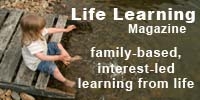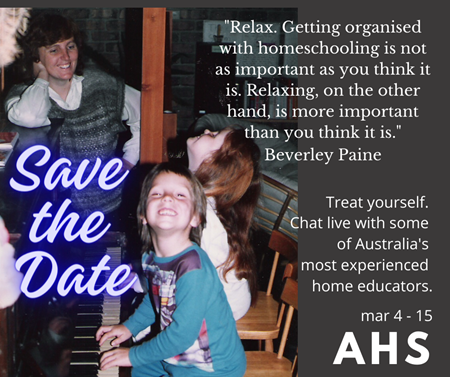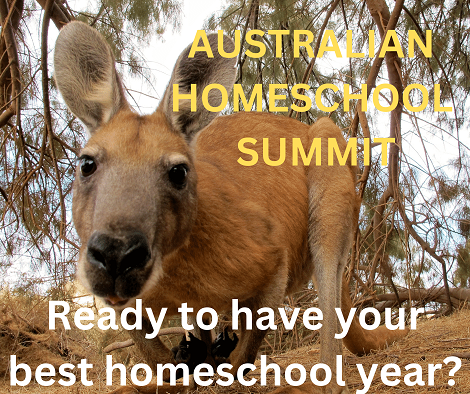|
How Many Hours Do We Have To Spend Teaching Our Children Every Day?
© Beverley Paine
I like the concept of the 'short lesson'. As my children grew we found that working from maths books usually required about an hour to allow them to concentrate and remember the concepts and techniques previously learned, practice new skills, consolidate that knowledge and ultimately master it. Often they would sit for an hour and half, about three times a week. When they moved into their teenage years they organised their own study and took what time they needed.
During the preschool and early primary school years we found mornings worked best for studying at desks. This usually meant writing and arithmetic, but within a couple of years we found unschooling activities supplanted school activities and learning from books became more haphazard, used as reference tools, reinforcement of concepts, or for enjoyment, rather than working through them systematically. I used the "contents" and any scope or sequence charts as an aid to planning our homeschooling learning program.
Every child and every family is different. Work to your child's temperament, characteristics, learning needs and you won't stray far from an excellent education. Surround your child with quality resources and materials - there is a comprehensive list in my booklet Learning Materials for the Homeschool, available for $2.50 from www.alwayslearningbooks.com.au .
As I say in my article on the short lesson, some children can work for hours on one task, while at other times their attention will be momentary. The emphasis is really on the quality of the learning experience, rather than how long it takes.
Answer #13 in Frequently Asked Homeschooling Questions
Many families are apprehensive about home education because they believe that it involves teaching children for six hours or more each school day. This is not so. A smaller "class" means more time can be spent with each child. It also means less of the control measures that usually preoccupy a teacher, such as calling the class to order, discipline, time settling children to work, or moving to and from classrooms. Excursions, recess and lunch time simply blend into family life.
Children in a home environment don't need to be constantly supervised while they are doing their lessons. Parents find that the amount of concentrated time they put into home education is often less than two hours a day, with a background supervisory role for the rest of the day. Children learn very efficiently with learning programs tailored to their individual needs. In addition, learning at home occurs throughout the day and evening and is often unplanned. It takes an observant parent to recognize and notice the learning that naturally and continuously happens through the course of the day and year.
A large proportion of the traditional school curriculum is covered by everyday living, excursions, through the media, and through conversations. In many cases there is no need to contrive artificial learning situations as the learning environment is rich in resources with many new experiences naturally occurring each day. Many children spend the afternoon engaged in pursuing hobbies, art and craft, or playing. Some children prefer to study in the evenings - homeschooling is flexible enough to suit the learning requirements of all family members.
"One question which often comes up is "How am I going to teach my kids six hours a day?" And I respond to that by saying, "Who's teaching your kids six hours a day now?" I was a good student in supposedly the best schools and it was a rare day that I got five minutes of teaching... that's five minutes of somebody's serious attention to my personal needs, interests, concerns, difficulties, problems.
Like most other kids in school, I learned that if you don't understand what's going on, for heaven's sake, keep your mouth shut. What happens when children become ill, or have an injury, etc.? Home teachers come in for three to five hours a week. It has been found that this is perfectly sufficient. These children don't fall behind. No child needs, or should stand, six hours of teaching a day, even if a parent were of a mind to give it. It would drive them up the wall!" John Holt

Was this article helpful? Was it worth $1.00 to you?
Your gift of $1 or more helps to keep this site operating
offering encouragement
and reassurance to families
wanting
better outcomes for their children.



Beverley Paine with her children, and their home educated children, relaxing at home.
Together with the support of my family, my aim is to help parents educate their children in stress-free, nurturing environments. In addition to building and maintaing this website, I continue to create and manage local and national home educating networks, help to organise conferences and camps, as well as write for, edit and produce newsletters, resource directories and magazines. I am an active supporter of national, state, regional and local home education groups.
"You've been an inspiration to me, I love the way
you really listen to people." Vanessa
"Whenever I read your writing I always come away
with increased confidence in my ability to provide and
share a wonderful learning journey with my family!" Davina
"Your guidance, understanding, support and words of
wisdom changed our lives. We now offer support and
organise many homeschooling events for others." Lesley
"Thank you once again for your prompt and friendly service.
I am convinced that your books are going to add
quality and peace of mind to my journey of teaching my kids
at home! Just from studying your website, until almost
2am
in the morning, I 've been encouraged!" Louisa
"Thank you for all your many,many reassuring words
over many, many years. You probably don't know exactly how
valuable you are to the Australian Home Education community.
I've been reading your stuff for maybe 8 years or more now.
And I'm very grateful." Gythaa


CLICK HERE
if you want to learn
how to write your own education plans
to suit
your unique children's
individual learning needs?
Or you are looking for quality curriculum and teaching tips...
|
|
Welcome to the World of Home Education
and Learning without School!
We began educating our children in 1985, when our eldest was five. In truth, we had helped them learn what they need to learn since they were born. I am a passionate advocate of allowing children to learn unhindered by unnecessary stress and competition, meeting developmental needs in ways that suit their individual learning styles and preferences. Ours was a homeschooling, unschooling and natural learning family! There are hundreds of articles on this site to help you build confidence as a home educating family. We hope that your home educating adventure is as satisfying as ours was! Beverley Paine
3 ESSENTIAL STEP BY STEP GUIDES
Let experienced home educators Beverley, Tamara and April walk you through HOW to create a learning plan that builds on solid foundations that works for YOUR family AND ticks all the boxes for home educaton registration!
|

Tap into Beverley's
experience
through her books
"Your books, your blogs helped me beyond words... they helped me to find comfort in knowing it is ok to choose exactly what is best for my family." Nisha
"Your books and information are mind blowing and already I am feeling good about this new experience." Diane
"Your guidance, understanding, support & words of wisdom changed our lives." Leslie
"I feel specially inspired by Beverley's words and, the more I read her comments, the more inspired I feel, since my need for support, respect for different parenting styles, and information are fully met." Marijo
|
 |
|

The information on this website is of a general nature only and is not intended as personal or professional advice. This site merges and incorporates 'Homeschool Australia' and 'Unschool Australia'.
The Educating Parent acknowledges the Traditional Aboriginal and Torres Strait Islander Owners, the Custodians of Australia, and pay our respects to Elders past and present and extend that respect to Aboriginal and Torres Strait Islander people viewing this website.

Advertise on this site.













Australia's premier online annual conferences, lifetime access to video and audio recordings, freebies, notes and associated resource guides.
EVERY SUMMIT IS UNIQUE!
$29 each  2023 2023   2022 2022   2021 2021
$25 each  2020 2020  2019 2019   2017 2017
"Biggest and best Aussie homeschool event of the year!"

Home education is a legal alternative
to school education in Australia.
State and Territory governments are responsible
for regulating home education and have different
requirements, however home educating families
are able to develop curriculum and learning programs
to suit the individual needs of their children.

Without revenue from advertising
by educational suppliers and Google Ads
we could not continue to provide information
to home educators. Please support us by letting
our advertisers know that you found them on
The Educating Parent. Thanks!
|
![]() About
About
![]() Blog
Blog
![]() Articles
Articles
![]() Curriculum
Curriculum
![]() Resource Directory
Resource Directory
![]() Shop
Shop
![]() Kids Pages
Kids Pages
![]() Facebook
Facebook

![]() SA
SA ![]() VIC
VIC ![]() NSW
NSW ![]() QLD
QLD ![]() TAS
TAS ![]() ACT
ACT ![]() NT
NT ![]() NSW
NSW ![]() QLD
QLD ![]() SA
SA ![]() WA
WA ![]() TAS
TAS ![]() ACT
ACT ![]() NT
NT 





















